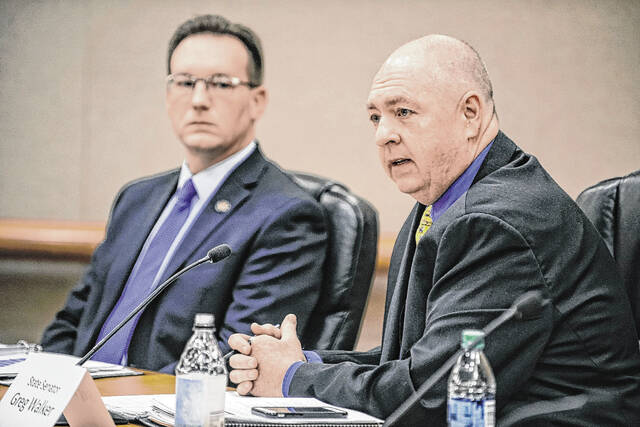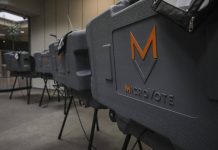
Mike Wolanin | The Republic State Sen. Greg Walker addresses issues related to legislation c during a Third House session with state legislators in the council chambers at Columbus City Hall in Columbus, Ind., Monday, March 25, 2019.
When the state legislators representing Bartholomew County return to session at the Indiana Statehouse next month, they will have vaccine mandates on their minds.
Front and center of the upcoming session starting Jan. 4 is House Bill 1001, which includes provisions that would allow Gov. Eric Holcomb to end the statewide COVID-19 public health emergency that has been in effect since the virus swept across the country in spring 2020, killing 17,757 Hoosiers so far, including 196 in Bartholomew County.
It also would force companies to allow medical or religious exemptions, as well as exemptions for so-called “natural immunity” of coronavirus survivors, to workplace COVID-19 vaccination requirements — no questions asked — among other provisions.
The consideration for the bill comes as COVID-19 cases and hospitalization rise to their highest levels in a year and vaccination rates continue to lag. Indiana has the ninth lowest vaccination rate in the U.S., according to the Centers for Disease Control and Prevention.
Last week, Columbus Regional Hospital said it recorded its highest inpatient patient load in its 104-year history as officials struggle to handle a flood of patients amid the worst coronavirus wave in a year and brace for what may lie ahead with the omicron variant. CRH reported 58 COVID-19 hospitalizations on Dec. 10, one shy of the all-time record set in December 2020.
About 2.9 million eligible Hoosiers had yet to get vaccinated as of Friday morning, including about 31,200 eligible people in Bartholomew County.
Rep. Ryan Lauer, R-Columbus, who co-authored House Bill 1001, said the proposed measure aims to “protect” Hoosier workers from federal COVID-19 vaccine mandates and would ensure that individual workers can claim religious or medical exemption to a vaccine requirement by an employer.
“I don’t think (your vaccination status) is any business of your employer, honestly,” Lauer said.
“Nobody should be faced with losing their job or making any medical decision that they or their doctor doesn’t feel is right for them, and who’s the government to decide what’s right for a person’s medical health?,” he said later in the interview.
When asked why now is a good time to end the public health emergency, Lauer said: “Because it’s time.”
“I mean, we’re (at), what, 700 days (in the state of emergency)?” Lauer said. “That’s not an emergency. …I think that we have the infrastructure, we have vaccines freely available, we have testing freely available. I think Hoosiers understand how to navigate through this time with COVID-19. My belief is that it doesn’t fit the definition of emergency being two years in an emergency. We can continue to protect the public. We can continue to do what needs to be done and not need to be in an official state of emergency.”
However, Lauer said, “I recognize there are various opinions on this (bill).”
Differing opinions
So far, some of the vaccination provisions of the bill have been a point of disagreement among some state legislators and business groups. Republican leaders had planned an extraordinary fast-track approval of the vaccine requirement limitations but called off a planned one-day session for the Monday after Thanksgiving, The Indianapolis Business Journal reported.
The Indiana Chamber of Commerce said Thursday that it opposes HB 1001, arguing that it would, among other things, “restrict and discourage employers from requiring vaccines in their workplaces” and require employers to pay for COVID-19 testing for unvaccinated workers.
“To greatly discourage and inhibit employers from getting their employees vaccinated to promote health and safety within their workplaces — at a time when there are surging infections, hospitalizations and deaths as the omicron variant has emerged — is simply the wrong policy in our view,” Indiana Chamber President and CEO Kevin Brinegar said in a statement.
Sen. Greg Walker, R-Columbus, said he feels that state legislators should avoid rushing a bill with that language through the General Assembly.
“I think employers locally and across the state are very concerned that we may have one set of vaccination rules to satisfy federal definitions and then a separate or a different set of rules to satisfy state definitions. It becomes very complicated on their part,” Walker said.
“I don’t feel like that’s appropriate for us to be attempting by statute to create laws or work rules that federal preemption may make … moot anyway,” Walker added. “There’s a lot of there’s a lot of things to be considered (for) why we don’t want to rush language like this into statute.”
Walker said one part of the bill that has concerned some employers is a provision that would allow workers who have been fired for refusing to get vaccinated to collect unemployment benefits.
Additionally, Walker said consumers “may have a strong interest in a vaccinated workforce” in certain high-risk environments, including healthcare settings, and that the U.S. Constitution doesn’t include a “right that you get to work for whoever you want to work for.”
“Our Constitution talks about contracts and that the law should not interfere with the ability to contract, and an employer-employee relationship is a two-way street,” Walker said.
Another point of contention is the religious exemption. Under HB 1001, if a company has a mandate, the proposed bill would require religious exemptions to be honored.
Lauer said, “there’s no religious test” under HB 1001, adding that the government is not capable of evaluating whether people truly hold those beliefs and “employers don’t want to be in that position either.”
“There are examples of companies in the state who have set up forms to review people’s religious petitions for objection and deciding whether they’re religious enough or not,” Lauer said. “That’s not consistent with the First Amendment of our Constitution. I think it’s important that that we respect people’s religious beliefs, and that means not getting into their business of how devout they are or, in some cases, I’ve seen (people) getting priests or rabbis or pastors involved in writing letters. That to me is not the job of employers. It’s not the job of the government.”
Walker said what constitutes “a heartfelt religious belief” is currently “ambiguous.”
“I think we need to be careful on how much we put it on the employer to try to make that determination, (and) how much we just declare that it cannot be challenged in any way,” Walker said.
“I’ve been looking for explanations about those religious convictions myself, and I’m not aware of too many major religions that have declared that that’s the case, but regardless, one’s faith is a personal matter,” Walker added. “I think we need to walk very carefully when we’re trying to do (this) by statute.”
Walker said the General Assembly may end up considering some elements of the bill without considering all of it or amending the bill or a companion bill could be introduced that has certain components of HB 1001 that would “relieve” the governor of using executive order to extend the public health emergency.
However, Walker expressed support for the governor retaining at least some emergency powers.
“State statutes cannot always respond with the proper speed to an emergency, and so that’s why the governor has those discretionary powers,” Walker said. “So how much do we want to tie the governor’s hands? …You know, 150 legislators cannot respond to an emergency the same way as one executive can.”
“I think you do need a chief executive,” he said.
Other priorities
Lauer and Walker said they also have other priorities for the upcoming session.
Lauer said he plans, among other things, to be involved with legislation this session on adding what he described as “more flexibility” to the types of vehicles schools can use to pick up children instead of buses and minimizing or eliminating stops at which children have to cross the street.
“I’ve been really focusing on improvements in how we approach bus routes and planning for having more input and more measures, frankly, on on the safety of the route planning,” Lauer said.
Lauer also said he think Hoosiers may see additional tax relief beyond the $125 refund already announced for Hoosiers who file a 2021 tax return, but the legislation has not yet been filed.
Walker said he plans to introduce legislation that would allow food growers to more easily market and sell their products directly to consumers.
Overall, Walker said his “first priority” is “don’t have a knee-jerk reaction to everything that happens.”




